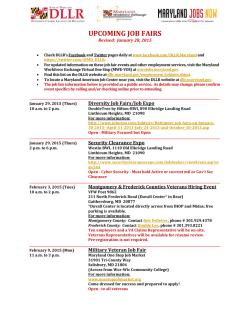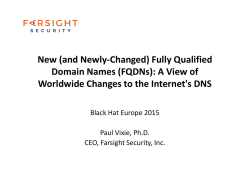
UMD AVP Elected Co-Chair of International Root Server System
Patuxent Building College Park, Maryland 20742-4911 301.405.7700 TEL 301.405.0300 FAX 301.405.7700 TEL DIVISION OF INFORMATION TECHNOLOGY FOR IMMEDIATE RELEASE University of Maryland Assistant Vice President Elected Co-Chair of International Root Server System Advisory Committee COLLEGE PARK, MD (February 2, 2015) – The University of Maryland’s Assistant Vice President and Deputy CIO for the Division of Information Technology, Tripti Sinha, has been elected co-chair of the Root Server System Advisory Committee (RSSAC) by its members effective January 1, 2015. Sinha was appointed to the RSSAC as the D-Root representative by the Internet Corporation for Assigned Names and Numbers (ICANN) Board of Directors. RSSAC advises the ICANN Board of Directors and community on the operation, administration, security, and integrity of the Internet’s Domain Name System (DNS) root server system. The Internet’s DNS root server system is crucial to maintaining one global Internet. To reach a specific computer or person on the Internet, one must use a unique address – a name or number. The DNS basically is the Internet’s underlying address book, and ICANN coordinates its unique identifiers around the world. The University of Maryland, a long-time participant in ICANN, is responsible for operating DRoot, one of the Internet’s 13 root name servers. Only 12 organizations worldwide operate this service for the entire Internet. Sinha sees her new role with RSSAC as an opportunity to provide even greater higher education representation and participation in the worldwide management of critical Internet services. Her appointment also illustrates the University of Maryland’s leadership in the global IT community. As co-chair of RSSAC, Sinha will communicate revised protocols and best practices for the operation of DNS servers, as well as matters relating to the administration of the root zone – the top of the DNS hierarchy. In addition, she will assist the committee with ongoing threat assessments and risk analyses of the root server system. “I am extremely honored by this unique opportunity to serve as co-chair for the RSSAC,” said Sinha. “The Internet is a vital service that connects the entire world, and I am excited to help lead the important work that maintains and protects this global resource.” Sinha’s appointment continues the University of Maryland’s long and storied history in the development of the Internet. As early as the mid-1980s, the university operated SURAnet, a regional network connecting research universities throughout the southeast to National Science Foundation (NSF) supercomputing resources around the country on NSFnet. -more- Page 2 In 1988, the university established the first Internet Exchange Point link connecting federal Transmission Control Protocol (TCP)/Internet Protocol (IP) networks to the first U.S. commercial and non-commercial Internet networks. In the same year, the university was selected to operate a DNS root server, the core of the Domain Name System that allows computers across the globe to translate human-friendly hostnames into computer-friendly IP addresses. Sinha has more than 25 years of technology experience in areas ranging from software engineering to network infrastructure management and operations. During her two-year term as co-chair of the RSSAC, she will continue in her University of Maryland roles as Assistant Vice President/Deputy CIO and Executive Director of Mid-Atlantic Crossroads (MAX), a multi-state, high-performance optical network led by the University of Maryland. About the University of Maryland The University of Maryland is the state’s flagship university and one of the nation’s preeminent public research universities. A global leader in research, entrepreneurship, and innovation, the university is home to more than 37,000 students, 9,000 faculty and staff, and 250 academic programs. Its faculty includes three Nobel laureates, three Pulitzer Prize winners, 47 members of the national academies, and scores of Fulbright scholars. The institution has a $1.8 billion operating budget, secures $500 million annually in external research funding, and recently completed a $1 billion fundraising campaign. For more information about the University of Maryland, visit www.umd.edu. Media Contact: Phyllis Dickerson Johnson, Director of Communications and Marketing, Division of Information Technology, University of Maryland, 301.405.4491, [email protected].
© Copyright 2026




